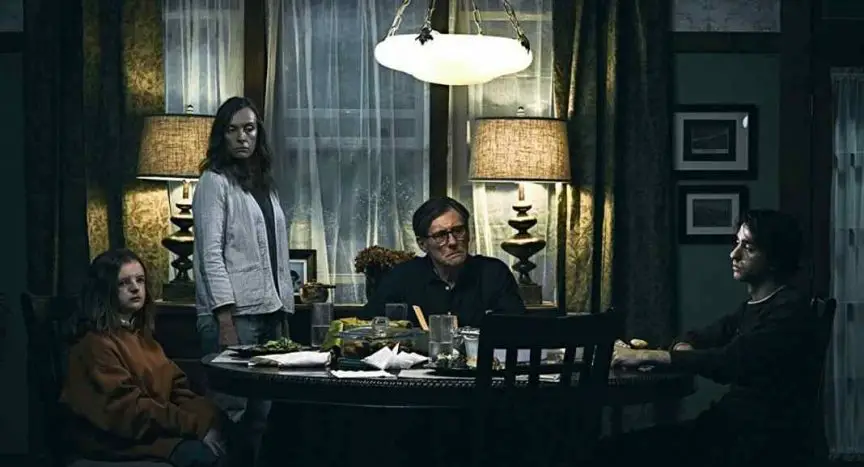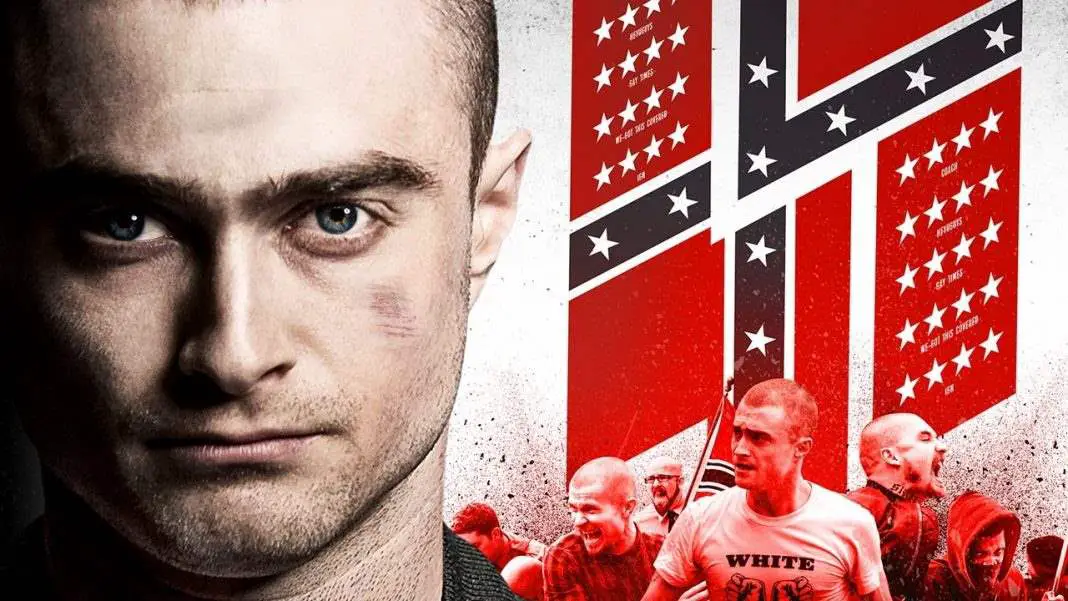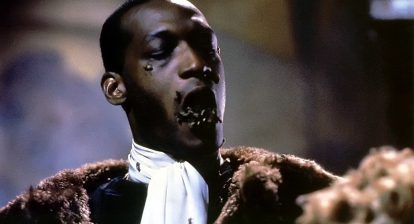There’s something worrisome going on with horror fans lately. It first reared its ugly head around the time of The Witch‘s release, and it’s happening again in response to Hereditary. For whatever reason, when a genre movie is doing well with critics, or at the box office, self-described hardcore horror fans turn against it. It’s not really horror, they moan. Only we get what it really is.
In the same way a film is suddenly not horror to snooty types just because it happens to be good, a horror movie loses its badge of honour when it becomes too acceptable to the mainstream.
This kind of reaction was particularly obnoxious with The Witch, a stark, often terrifying, and incredibly assured debut feature that turned the entire genre on its head. With Hereditary, it’s just plain baffling. The movie is proper scary. It’s weird. It has the courage of its convictions. It’s well-performed. It has a bat-shit crazy ending. It’s been well-received pretty much across the board. Why are we turning against it?
Hell, if horror fans continue down this road, soon we’ll turn into the equivalent of crazed MCU/DC types decrying that only we, as the consumers, get to decide what’s just and right anymore. Only the classics will do! But never reboots! Release the real cut! Etc.
The backlash has been so intense that even celebrated critic, and lifelong horror fan, Mark Kermode got involved. He gave the film a disappointingly harsh review based, whether he wants to fully admit it or not, on another critic having referred to it as The Exorcist for a new generation (a pull-quote represented on much of the film’s marketing material, understandably so).

Kermode misinterpreted this as some lunatic claiming Hereditary was just as good if not better than his all-time favourite film. He was so mad he made a vlog about it before even seeing the flick. When the time did come, Dr. K turned against it completely, picking Hereditary apart to an extent not afforded to the vastly overrated, and similarly-themed, Babadook, of which he is a huge and vocal fan.
In an entertaining chat with fellow critic Robbie Collin, who loved Hereditary, on the Kermode and Mayo Film Review show, he acquiesced in the face of an obvious and convincing argument for the film’s merits. This suggested Kermode understood he was being a bit unfair as a result of his own prejudices.
However, on a subsequent podcast, the good doctor did a complete 180, arguing about how “wrong” his colleague was when Collin wasn’t there to contribute. It seems he just couldn’t get past that Exorcist comparison. Or he really hated the film for some other reason, known only to him (something to do with welcome mats, apparently).
This is a depressingly familiar pattern with the anti-Hereditary crowd. The whole argument against the movie seems to boil down to “I just didn’t like it,” which, er, isn’t an opinion. The film isn’t perfect, that goes without saying, and its nutso ending is either going to make you cheer or groan. But to suggest it’s bad, or not “proper horror”, is misguided.
What’s being missed here whether you loved or hated the movie is that it’s still something worth celebrating primarily because it exists at all.

Cast your mind back ten years, or even five, and consider what kind of horror movies were making it into cinemas at that time. The choice for genre fans was between the likes of Saw V, Texas Chainsaw 3D, et al. There wasn’t a huge amount of variety at the local multiplex and although, as horror fans, we know to look elsewhere for our genre fix, there’s something undeniably cool about seeing a great horror movie on the big screen (outside of the usual festival environment, of course).
We’ve been so lucky over the past few years with films like It Follows, The Witch, Green Room, and now Hereditary, all making it into theatres that it’s easy to forget there was a time when the only horror movies on offer were boring, big budget studio flicks (imagine if Truth or Dare was the only option available to you — seriously). Spoiler ahead.
Ari Aster’s debut is a slow-burning, defiantly lengthy (two hours plus!) family horror movie that never once pauses for breath or to provide any levity from the terror of what’s unfolding before our eyes. From that brilliant opening shot, the camera gliding into the creepy model home, to the final glimpse of poor Alex Wolff, taken in by cult members after being utilised as a vessel for the devil himself, it pulls precisely zero punches.
The atmosphere is so dread-laden it seems to soak into Toni Collette’s skin, her hair hanging limply against her face as though it’s given up trying to exist just as she has. Gabriel Byrne, who in any other film would save the day and emerge relatively unscathed, gets burnt to a bloody crisp. There are no jump scares, no hints in the pared-back score of what’s to come. It’s pure nightmare fuel set predominantly in the family home.
Aster plays with typical horror conventions by introducing an oddball kid only to get rid of her — in, it has to be said, particularly gruesome fashion — before the first act is even up. He drops clues for the audience that the characters pick up on way too late, injecting a jet-black strain of humour.
 Smartly, Hereditary presents itself as one kind of film, a film we know and understand, before morphing into something entirely different, something that feels horrifyingly familiar and yet completely unknown.
Smartly, Hereditary presents itself as one kind of film, a film we know and understand, before morphing into something entirely different, something that feels horrifyingly familiar and yet completely unknown.
How many of us watched that brilliant first trailer and assumed we knew exactly what we were getting? Does much of the backlash therefore come from fans butthurt that the marketing material didn’t deliver the film they’d arrogantly expected (leading to the dreaded accusations of “over-hype)?
First-timer Aster wears his influences on his sleeve, but even though Hereditary doesn’t blaze a trail the way The Witch does, it creates an atmosphere of tension and terror that is hitherto unmatched in modern horror. Put simply, the film is really fucking scary.
It’s scary in how it lulls us into a false sense of security in its initial moments. It’s scary in how intense its final act is, edging towards a conclusion that Aster is 100 percent committed to, rather than pulling back to give us the relief of everything working out okay in the end.
It’s scary in Collette’s emotionally charged, vulnerable, and completely fearless central performance, which suggests her character is capable of something terrible even without the addition of paranormal foes. It’s scary in Wolff’s desperate, isolated, tortured teenager who finds everything he believes about his life torn to shreds in the place he should feel safest.
 Movies like Hereditary aren’t interested in making the Friday night multiplex crowd scream and cheer, or in generating big bucks at the box office. They’re made in order to cause those who watch this shit as a hobby, who wear it as a badge of honour, to question their commitment, to hide behind their hands and clutch their stomachs and hope it’s all over soon. They’re made to challenge us, rather than defer to us.
Movies like Hereditary aren’t interested in making the Friday night multiplex crowd scream and cheer, or in generating big bucks at the box office. They’re made in order to cause those who watch this shit as a hobby, who wear it as a badge of honour, to question their commitment, to hide behind their hands and clutch their stomachs and hope it’s all over soon. They’re made to challenge us, rather than defer to us.
The suggestion that real horror fans see through Hereditary, which has been trotted out by Kermode and many others in much the same way it was with The Witch, is arrogant and misguided. Genuine lovers of this weird little genre will see the merits of a film this weird, this intense, this terrifying. The fact it’s made it into theatres so it can scare as many viewers as possible — casual and hardcore alike — should be an added bonus.
Even if you hate it for whatever reason, which okay fine, movies like Hereditary must be celebrated for their art-horror weirdness, their commitment to terrorising us, and their complete refusal to succumb to being the next Paranormal Activity or The Darkness (does anybody even remember that film?) where everything works out exactly as we expect and the general feeling after watching is one of comfort, of familiarity.
Even if you hate it, do so for the right reasons, not because someone put it in the same sentence as The Exorcist, or because mainstream critics think it’s great, or because “norms” are lame enough to be scared by it.
Hereditary wants to make us uncomfortable. And we should let it. Otherwise, it’ll be back to the usual routine of watching The Other Side of the Door because there’s nothing else on offer. Please don’t do that to us. We’ve suffered enough.







